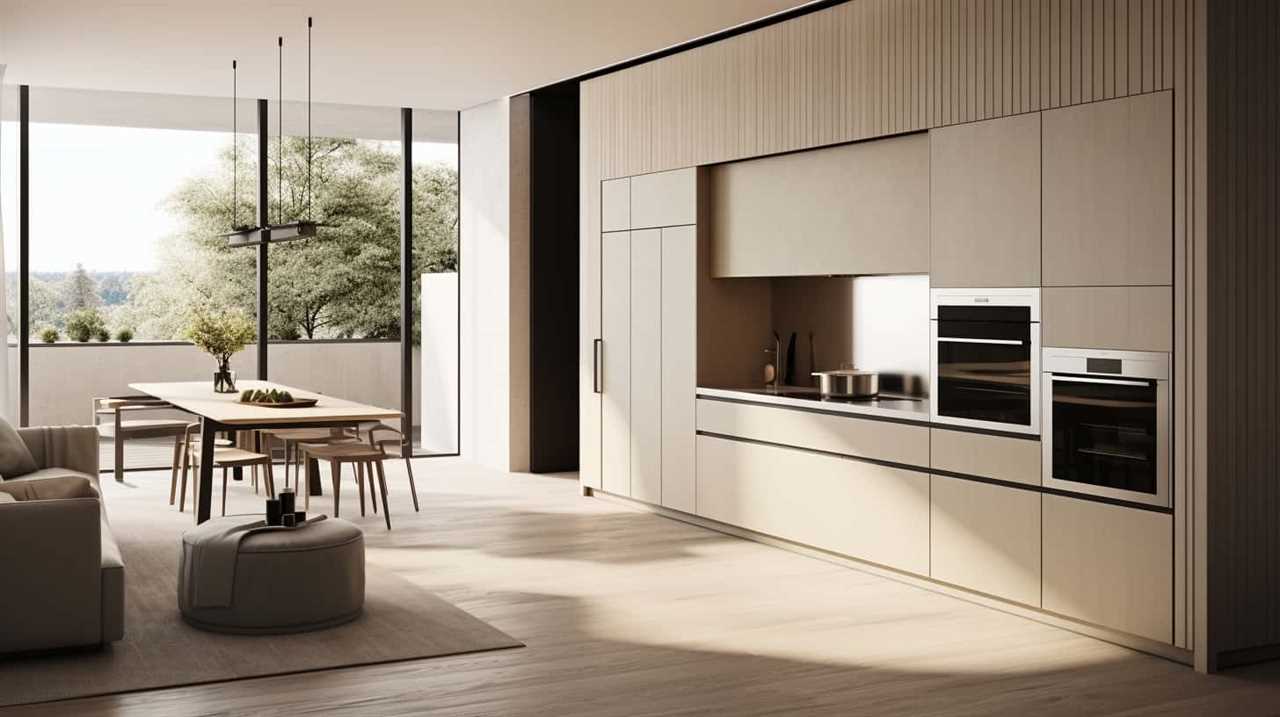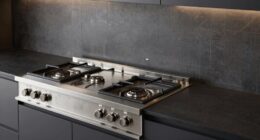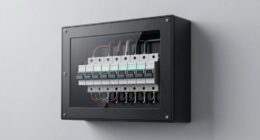Ever thought about how appliances consume electricity? We’re here to give you the answers.
In this article, we’ll delve into the principles of electricity, the workings of electrical circuits and currents, and the fascinating process of energy conversion in appliances.
From heating appliances to cooling and communication devices, we’ll explore it all.
Additionally, we’ll discuss energy-efficient appliances and provide tips on reducing appliance energy usage.

Get ready to master the world of appliance electricity!
Key Takeaways
- Appliances convert electrical energy into mechanical, thermal, or light energy.
- Understanding energy conversion and efficiency is essential for appliance functionality.
- Energy efficient appliances minimize energy consumption while providing optimal performance.
- Choosing energy efficient appliances helps conserve energy and reduce environmental impact.
Principles of Electricity
Now let’s delve into the principles of electricity and how it powers our appliances. Understanding the principles of electricity is crucial for comprehending how our appliances operate. Electricity is the flow of electrons through a conductor, such as a wire. It’s governed by certain principles that we must grasp in order to harness its power effectively.
One of these principles is electrical circuits. An electrical circuit is a closed loop through which electricity flows, consisting of a power source, conductors, and loads. The flow of electricity in a circuit follows specific rules, such as Ohm’s Law, which relates voltage, current, and resistance. By understanding these principles, we can ensure the safe and efficient operation of our appliances.
Now, let’s explore how electrical circuits and currents interact to power our devices.

Electrical Circuits and Currents
To understand how appliances use electricity, we need to comprehend the role of electrical circuits and currents.
Electrical circuits are pathways that allow the flow of electrical current, which is the movement of electric charges. Current flows from a power source, such as a battery or a power outlet, through wires and components, and back to the source.
The flow of current is measured in amperes (A) and is influenced by electrical resistance. Resistance is the property of a material that opposes the flow of current. It’s important to consider electrical resistance when designing circuits to ensure the proper functioning of appliances.
Additionally, understanding electrical safety is crucial when working with circuits, as it helps prevent electric shocks and other hazards. Following proper safety protocols and using appropriate protective equipment are essential for maintaining a safe electrical environment.

Energy Conversion in Appliances
As we delve into the topic of ‘Energy Conversion in Appliances’, it’s important to understand the process by which electrical energy is transformed into other forms of energy. This energy conversion is a fundamental aspect of how appliances operate and perform their designated functions. Here are three key points to help you grasp the concept:
- Energy Conversion: Appliances convert electrical energy into various forms such as mechanical, thermal, or light energy. This conversion allows appliances to perform specific tasks, such as rotating a motor or generating heat.
- Electrical Efficiency: The efficiency of this energy conversion is crucial. It refers to how effectively an appliance converts electrical energy into its intended form. Higher efficiency means less energy wasted and more output achieved, resulting in cost savings and reduced environmental impact.
- Optimizing Energy Conversion: Manufacturers continuously strive to improve electrical efficiency in appliances. This involves utilizing advanced technologies, optimizing designs, and implementing energy-saving features to maximize performance while minimizing power consumption.
Understanding the principles of energy conversion and electrical efficiency is essential for mastering the functionality and performance of appliances.
Now, let’s explore how these principles apply to heating appliances.
Heating Appliances
When it comes to heating appliances, there are two main options to consider: electric and gas heating.

Electric heating appliances rely on electricity to generate heat, while gas heating appliances use natural gas or propane.
One important factor to consider when choosing between the two is energy efficiency ratings, which can help determine the cost-effectiveness of the appliance in the long run.
Electric Vs Gas Heating
We use both electric and gas heating appliances in our homes. When it comes to heating, there are distinct differences between gas and electric options. Here are some key points to consider:
- Gas vs Electric Stoves: Gas stoves use natural gas as a fuel source, while electric stoves rely on electricity. Gas stoves provide instant heat and precise control over temperature, making them ideal for professional chefs. Electric stoves, on the other hand, offer even cooking and are easier to clean.
- Heating Efficiency: Gas heating appliances tend to be more energy-efficient compared to electric ones. Gas furnaces have higher energy efficiency ratings, meaning they convert more fuel into usable heat. This not only reduces energy consumption but also lowers heating costs.
As we delve into the topic of energy efficiency ratings, we’ll further explore the benefits of using appliances that prioritize energy conservation.

Energy Efficiency Ratings
Now let’s delve into the energy efficiency ratings of heating appliances and explore the benefits of using appliances that prioritize energy conservation.
Energy efficient appliances are designed to minimize energy consumption while providing optimal heating performance. These appliances are labeled with energy efficiency ratings that indicate their level of efficiency. The ratings are typically expressed as a percentage, with higher numbers indicating greater energy efficiency.
By opting for energy efficient appliances, consumers can enjoy several benefits.
Firstly, they can significantly reduce their energy bills, as these appliances use less electricity or gas to produce the same amount of heat.

Secondly, energy efficient appliances contribute to a greener environment by reducing greenhouse gas emissions.
Lastly, these appliances tend to have a longer lifespan and require less maintenance, making them a wise long-term investment.
Cooling Appliances
Cooling appliances function by extracting heat from their surroundings through the use of refrigerants. These appliances play a crucial role in maintaining a comfortable indoor environment, especially during hot summer months.
To help you understand cooling appliances better, here are some important points to consider:

- Cooling Efficiency:
- Look for appliances with high energy efficiency ratings to ensure optimal cooling performance while minimizing energy consumption.
- Consider features like variable speed compressors and smart thermostats that enhance cooling efficiency and reduce energy waste.
- Regularly clean or replace air filters to maintain optimal cooling efficiency and prevent the appliance from working harder than necessary.
- Maintenance Tips:
- Keep the appliance’s condenser coils clean and free from debris to ensure proper heat transfer.
- Check and seal any air leaks in the appliance’s ductwork to prevent cool air from escaping.
- Schedule regular professional maintenance to identify and address any potential issues before they become major problems.
Lighting Appliances
For lighting appliances, a common choice in households is the use of LED bulbs. LED stands for Light Emitting Diode, and these bulbs are known for their energy efficiency and long lifespan.
LED bulbs are designed to produce light more efficiently compared to traditional incandescent bulbs by converting more electricity into light and less into heat. This makes them an excellent choice for energy-saving lighting design.
Additionally, LED bulbs have a longer lifespan, which means fewer replacements and less waste. To further optimize energy usage, consider using dimmer switches to adjust the light intensity as needed.
Another energy-saving tip is to turn off lights when not in use. By adopting these measures, households can achieve significant energy savings and contribute to a more sustainable future.

Kitchen Appliances
When it comes to kitchen appliances, there are three key points to consider: energy efficiency, power consumption, and their impact on electricity bills.
Energy-efficient kitchen appliances are designed to minimize the amount of electricity they use while still providing optimal performance.
Understanding the power consumption of your appliances can help you make informed decisions about your energy usage.
Lastly, the impact that kitchen appliances have on your electricity bills is significant, so it’s important to choose appliances that are energy efficient to reduce costs in the long run.

Energy-Efficient Kitchen Appliances
We love using energy-efficient kitchen appliances because they help us save electricity and reduce our carbon footprint. These appliances employ energy saving techniques and are designed to be eco-friendly.
Here are three reasons why energy-efficient kitchen appliances are a great choice:
- Energy savings: Energy-efficient appliances are built to minimize energy consumption, resulting in lower electricity bills and reduced environmental impact.
- Environmental friendliness: These appliances are designed with eco-friendly features, such as improved insulation and efficient cooling systems, reducing greenhouse gas emissions.
- Smart technology: Energy-efficient appliances often come with smart features that allow us to monitor and control their energy usage, optimizing efficiency and reducing waste.
Power Consumption of Appliances
Energy-efficient kitchen appliances are designed to minimize power consumption and help us save electricity while reducing our carbon footprint. It is important to understand the power consumption of our appliances to effectively manage our energy usage and reduce our electricity bills. Here are some key power management tips for kitchen appliances:
| Appliance | Average Power Consumption (Watts) | Energy Saving Tips |
|---|---|---|
| Refrigerator | 100-400 | Keep the refrigerator well-stocked. |
| Dishwasher | 1200-2400 | Run full loads and use energy-saving modes. |
| Microwave | 600-1500 | Use microwave-safe containers. |
| Electric Stove | 1000-3000 | Use lids to retain heat and cook efficiently. |
Impact on Electricity Bills
To understand the impact of kitchen appliances on our electricity bills, it’s crucial to consider their power consumption and implement energy-saving practices. By doing so, we can’t only reduce our energy costs but also minimize our impact on the environment.

Here are some energy-saving tips to help you make informed choices:
- Opt for energy-efficient appliances: Look for appliances with the ENERGY STAR label, as they’re designed to consume less electricity.
- Unplug when not in use: Even when appliances are turned off, they can still draw power. Unplugging them when not in use can save energy and reduce your electricity bill.
- Cook efficiently: Use the appropriate size of cookware, match the burner size to the pot, and cover pots and pans to retain heat, reducing cooking time and energy consumption.
Implementing these energy-saving practices can help you save money on your electricity bills while also reducing your environmental impact.
Laundry Appliances
The laundry appliances in our homes play a significant role in our daily lives by efficiently cleaning and drying our clothes. When it comes to energy efficiency, modern laundry appliances have made great strides in reducing their environmental impact. These appliances are designed to use less energy while still providing excellent cleaning and drying performance. Additionally, they have features such as load sensors and adjustable water levels that help minimize water consumption in laundry appliances. Let’s take a look at a comparison table to see the energy efficiency and water consumption of different laundry appliances:
| Appliance | Energy Efficiency | Water Consumption |
|---|---|---|
| Washing Machine | High | Adjustable |
| Dryer | Moderate | N/A |
| Washer-Dryer Combo | Moderate | Adjustable |
Entertainment Appliances
While entertainment appliances may not be as essential as laundry appliances, they still play a significant role in our daily lives. Our entertainment systems and home theaters offer us a way to unwind and relax after a long day.

Here are three key points to consider when it comes to how these appliances use electricity:
- Power Consumption: Entertainment appliances, such as televisions, gaming consoles, and sound systems, consume varying amounts of power depending on their features and usage.
- Standby Mode: Many entertainment appliances have a standby mode that consumes a small amount of power even when they aren’t in use. It’s important to turn off these appliances completely to reduce unnecessary energy consumption.
- Energy-efficient Options: When purchasing entertainment appliances, look for energy-efficient models that are designed to consume less electricity without compromising on performance.
Understanding how our entertainment appliances use electricity can help us make informed choices and reduce our energy consumption.
Communication Appliances
Moving on from entertainment appliances, communication appliances also play a crucial role in our daily lives. These appliances enable us to stay connected with the world and communicate effectively. From smartphones to smart home devices, communication appliances have become an integral part of our lives.
One of the key advancements in communication appliances is the integration of wireless technology. This allows us to connect and communicate without the need for physical wires, making our lives more convenient and efficient. Whether it’s sending emails, making phone calls, or controlling our smart home devices, wireless technology has revolutionized how we communicate.

To better understand the role of communication appliances, let’s take a look at the following table:
| Appliance | Functionality | Example |
|---|---|---|
| Smartphone | Communication, internet access | iPhone, Samsung Galaxy |
| Smart speaker | Voice control, smart home | Amazon Echo, Google Home |
| Tablet | Portable communication, browsing | iPad, Samsung Galaxy Tab |
Communication appliances not only keep us connected, but they also contribute to the overall convenience and efficiency of our lives. With the constant advancements in technology, we can expect communication appliances to continue evolving and enhancing our daily communication experiences.
Energy-Efficient Appliances
Now let’s explore energy-efficient appliances and how they contribute to reducing electricity consumption in our daily lives.
Energy efficient technology has revolutionized the way we use appliances by optimizing their energy usage and minimizing waste. Here are some benefits of energy efficient appliances:

- Lower energy bills: Energy efficient appliances consume less electricity, resulting in reduced energy bills. This not only saves money but also helps in conserving valuable resources.
- Environmental impact: By using energy efficient appliances, we can significantly reduce our carbon footprint. These appliances consume less electricity, which means fewer greenhouse gas emissions and a healthier planet.
- Longer lifespan: Energy efficient appliances are designed to be more durable and reliable. They’re built with advanced technology that ensures longer lifespan, reducing the need for frequent replacements.
Investing in energy efficient appliances is a smart choice that benefits both our wallets and the environment.
Standby Power Consumption
As we delve deeper into the topic of electricity usage by appliances, let’s now explore the issue of standby power consumption and its impact on energy efficiency.
Standby power consumption refers to the energy consumed by appliances when they aren’t in use but remain plugged in or in standby mode. This can be a significant source of energy waste, as appliances continue to draw power even when not actively being used.
To address this issue, many appliances are now equipped with power saving features that aim to reduce standby power consumption. These features automatically switch the appliance to a low-power mode or completely turn it off when not in use for a certain period of time.

Tips for Reducing Appliance Energy Usage
When it comes to reducing appliance energy usage, there are two key points to consider.
First, opting for energy-saving appliance options can make a significant difference in overall electricity consumption. Look for appliances with high energy efficiency ratings and features like smart power management.
Second, efficient appliance usage is crucial. This includes using appliances only when necessary, properly maintaining them, and utilizing energy-saving settings and features whenever possible.
Energy-Saving Appliance Options
We can reduce appliance energy usage by implementing energy-saving options. By adopting smart home technology, appliances can be controlled remotely, allowing for better energy management. Additionally, integrating renewable energy sources such as solar panels or wind turbines can reduce reliance on fossil fuels and decrease overall energy consumption.

Here are three energy-saving options for appliances:
- Energy-efficient models: Choose appliances with high energy efficiency ratings, such as those with Energy Star certification.
- Power management features: Look for appliances that have power-saving modes or timers that automatically turn off when not in use.
- Proper maintenance: Regularly clean and maintain appliances to ensure they operate efficiently, such as cleaning refrigerator coils or replacing furnace filters.
Efficient Appliance Usage
To effectively reduce appliance energy usage, we can implement efficient usage practices. By adopting these practices, we can significantly reduce wastage and save on our electricity bills. One way to achieve this is by using smart appliances that are designed to optimize energy consumption. These appliances are equipped with advanced features such as energy-saving modes, timers, and sensors that automatically adjust settings based on usage patterns. Additionally, we can follow simple habits like unplugging appliances when not in use, using power strips to easily turn off multiple devices at once, and utilizing natural light instead of artificial lighting. By being mindful of our appliance usage and making small changes, we can make a big impact on reducing energy consumption and promoting sustainability.
| Efficient Appliance Usage Tips | Benefits |
|---|---|
| Use smart appliances | Optimize energy consumption |
| Unplug appliances when not in use | Prevent standby power usage |
| Utilize natural light | Reduce reliance on artificial lighting |
Frequently Asked Questions
How Much Electricity Does an Average Household Appliance Consume?
On average, household appliances consume varying amounts of electricity. However, energy efficient appliances are designed to minimize consumption. It’s important to consider standby power, which can have a significant impact on overall energy usage.
Can Appliances Be Powered by Renewable Energy Sources?
Appliances can be powered by renewable energy sources, such as solar or wind power. This offers several advantages, including reduced carbon emissions and decreased reliance on non-renewable resources.

What Are Some Common Safety Tips for Using Appliances?
Appliance maintenance and safety precautions are crucial for a safe and efficient operation. Regularly inspecting and cleaning appliances, following manufacturer’s instructions, and avoiding overloading circuits are essential steps to prevent accidents and prolong appliance lifespan.
Are There Any Government Regulations or Standards for Energy Consumption in Appliances?
Government regulations and energy efficiency standards play a crucial role in ensuring that appliances use electricity efficiently. These regulations help to reduce energy consumption, promote sustainability, and encourage the development of more environmentally friendly appliances.
Are There Any Appliances That Do Not Require Electricity to Operate?
Yes, there are alternative power sources and non-electric appliances available. These appliances utilize different methods, such as solar power, manual operation, or gas combustion, to function without relying on electricity.
Conclusion
To conclude, appliances are marvels of electricity consumption. They tirelessly convert energy, heat or cool our surroundings, and keep us connected.

It’s fascinating how these devices, with their efficient designs, consume power even when not in use. Isn’t it ironic? But fear not, dear reader, for we’ve shared tips to help you reduce their energy usage.
So go forth and enjoy the wonders of modern appliances, while also being mindful of their sneaky electricity habits.









